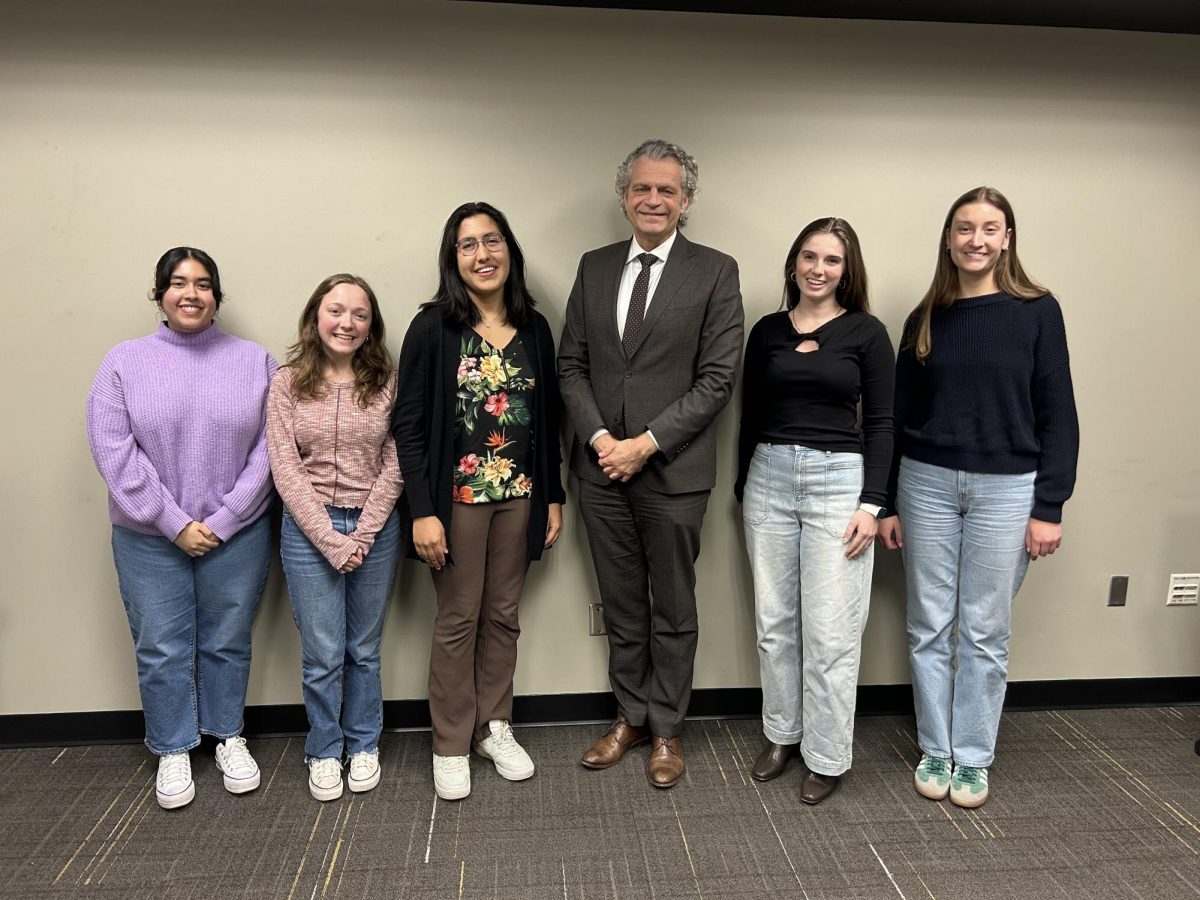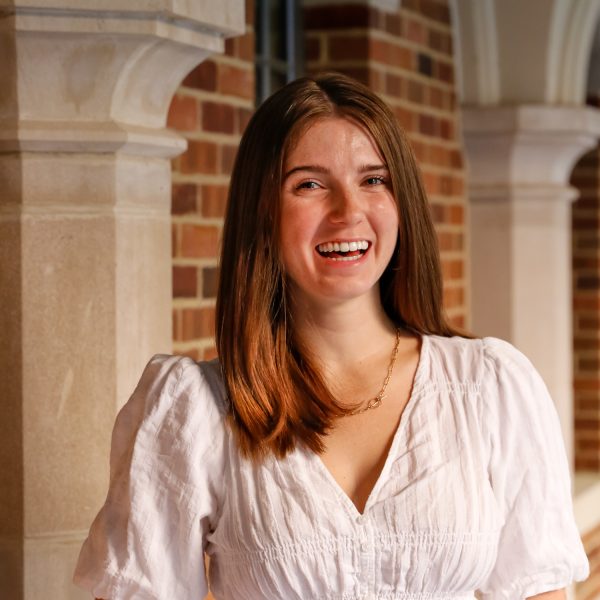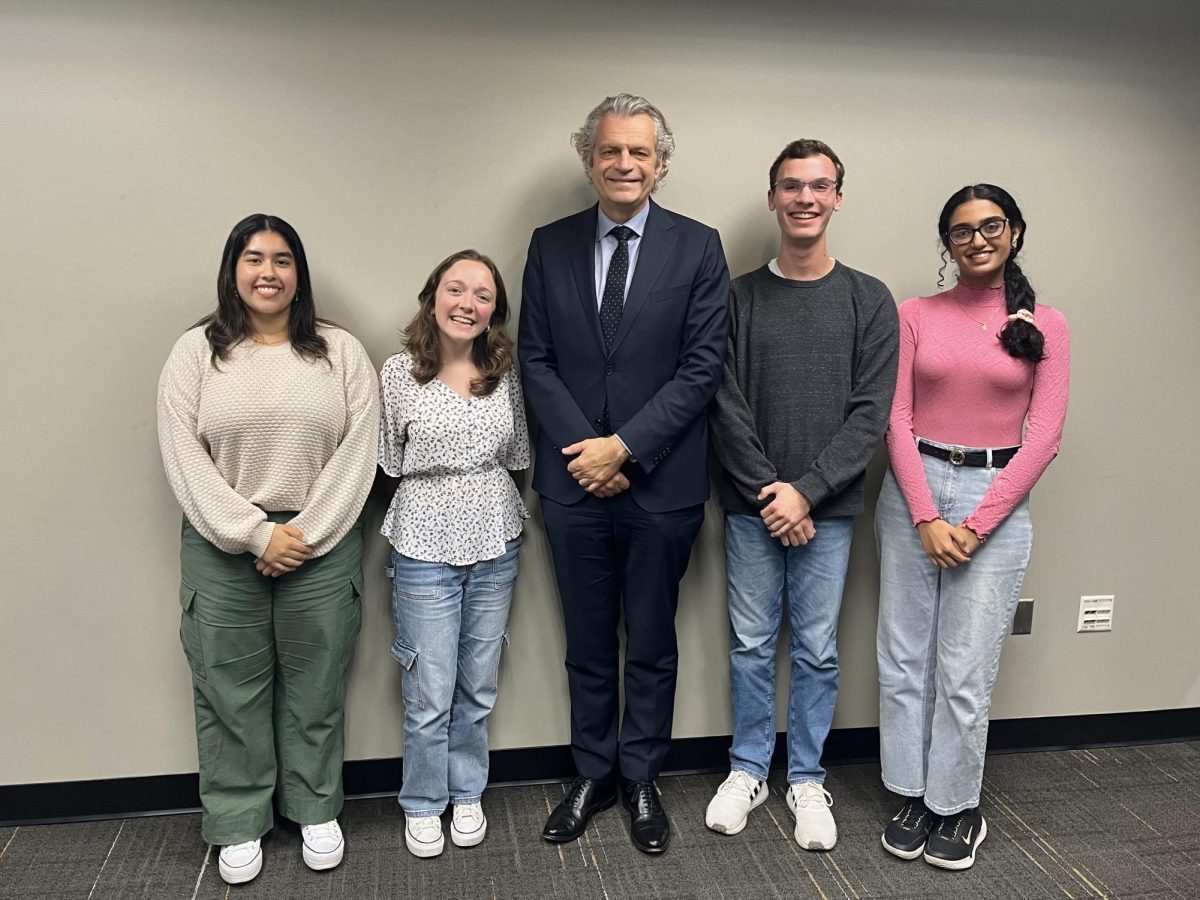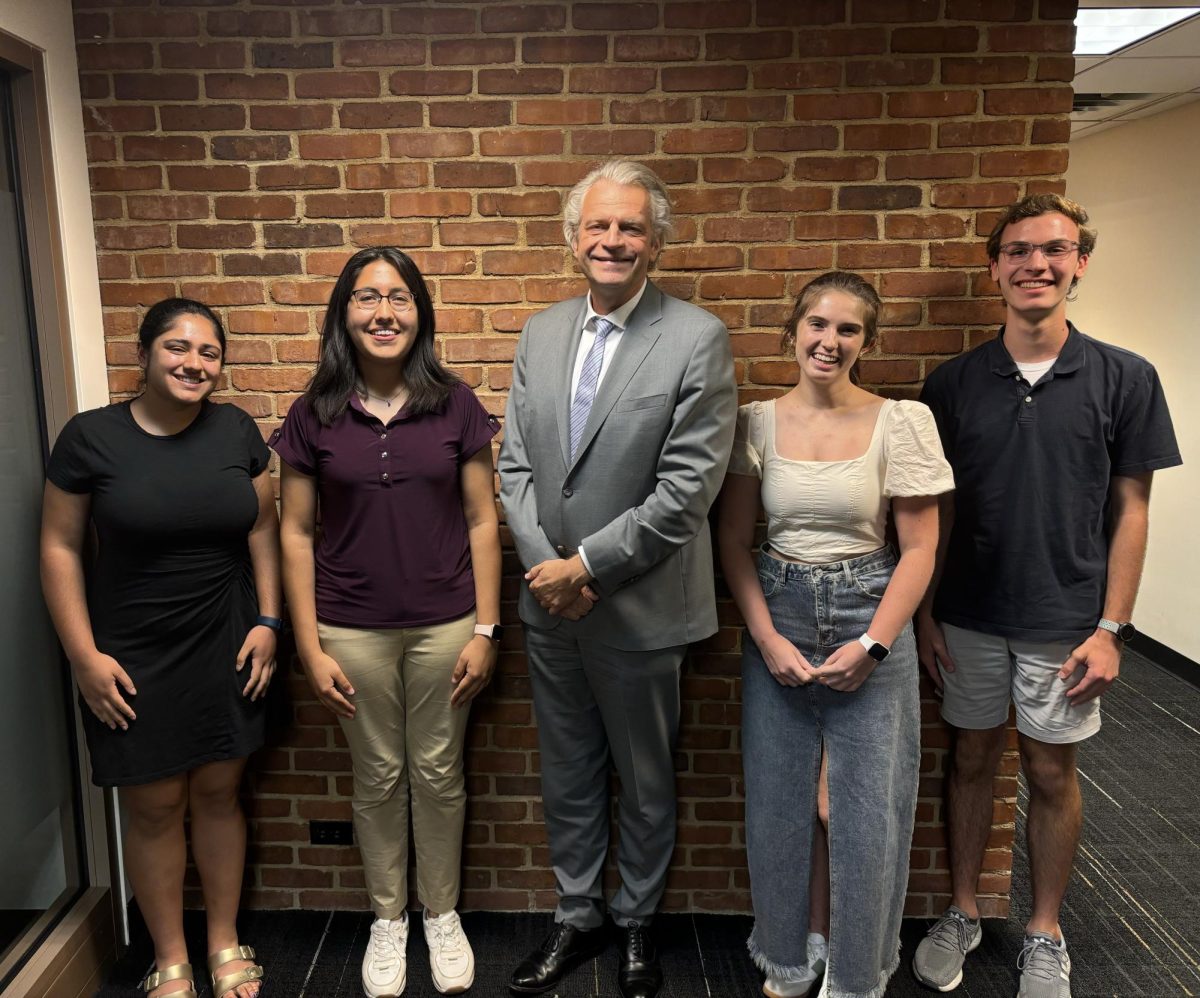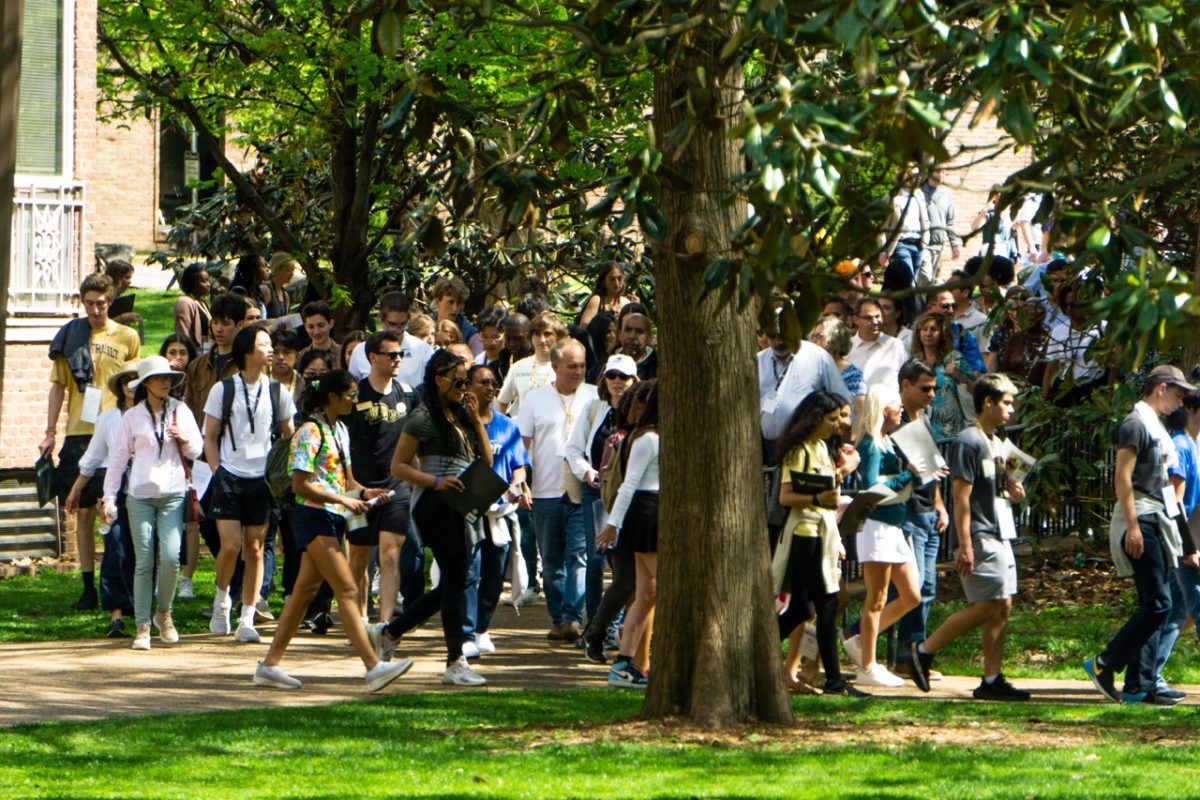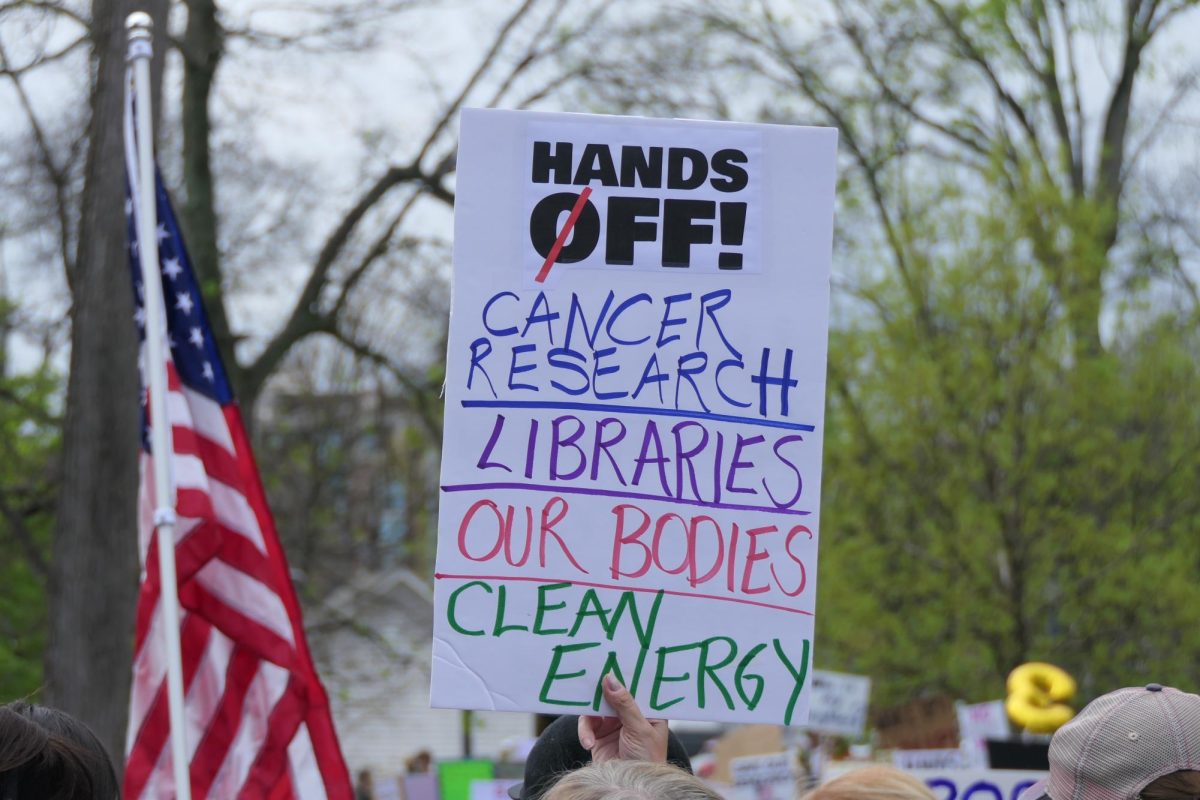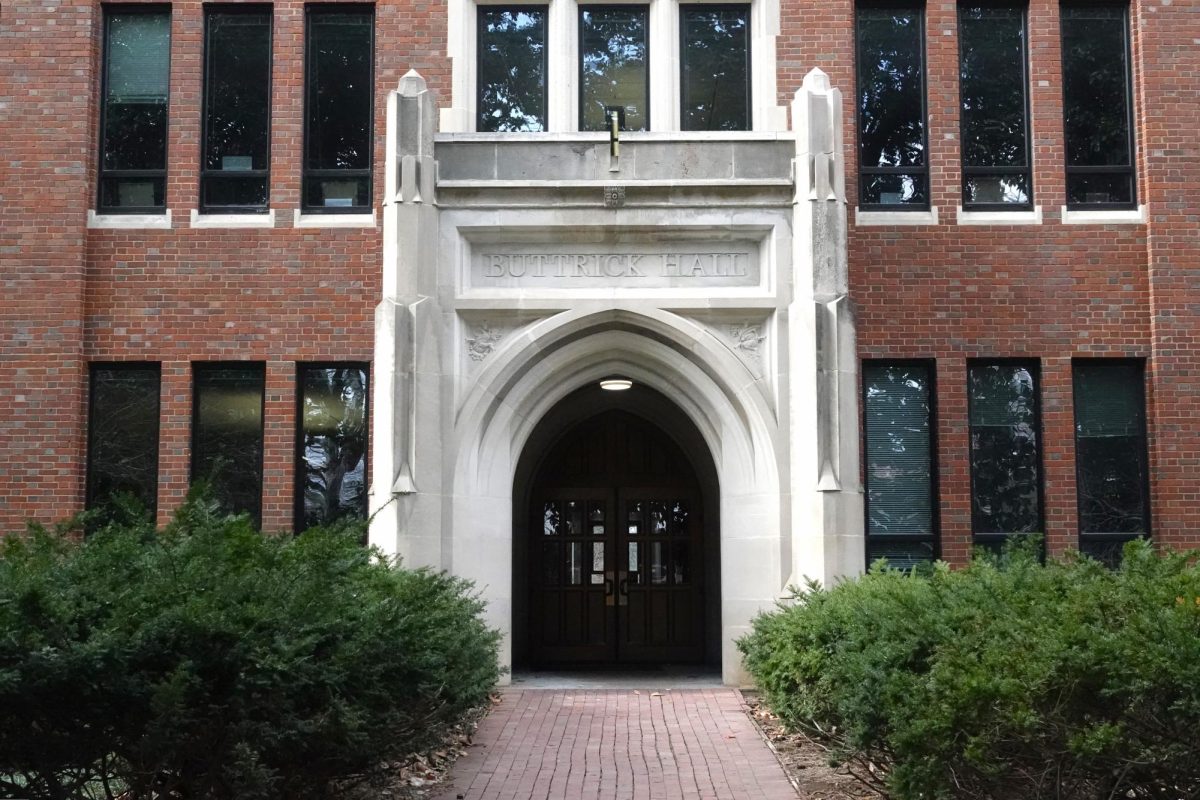The Hustler spoke with Chancellor Daniel Diermeier for the last debrief of the 2024-25 school year. He shared insight into the university’s response to federal policy changes, cuts to federal funding and limitations on initiatives promoting diversity, equity and inclusion, as well as immigration enforcement on college campuses.
Additionally, Diermeier discussed March Madness, this year’s commencement speaker and his advice to the Class of 2025 ahead of graduation. He also reflected on three years with the new logo.
Trump administration
The Hustler: As we are almost 100 days into President Donald Trump’s second administration, how do you believe the recent changes to federal DEI policy, education policy and federal funding have affected Vanderbilt? How has the university been responding to these changes?
Diermeier: First, our commitment to our values has never changed. We always want to be a destination for the most promising faculty, staff and students and provide an environment where every one of them can thrive.
Whenever a new administration comes in, they change [the] rules and regulations — the Biden administration’s regulations were different from the [first] Trump administration’s. Our job is to make sure we align and comply with them in our processes and [communication]. So, [there have been] no changes on our overall values and how we think about our community, but we need to align with [federal] regulations.
Number two is research funding. There [have] been an enormous amount of changes and challenges that we had to deal with over the last three months. The provost’s office has done a fantastic job with the partners in the Office of the General Counsel and others across the university to make sure we are getting through this as well as we can [while] supporting our faculty and our students in their research. Many decisions are very specific — to a specific research environment, to a specific lab, to a specific faculty or to a specific grant. Overall, we’re in pretty good shape at this point. Obviously, these things can change dramatically, but we have not seen the same impact here that we have seen at other universities. We are actively working to support the faculty and students [who] have been affected by specific grant cuts.
There’s a general concern over research funding in this country, particularly [the National Institutes of Health] funding, but we’re also worried about other funding sources — the [National Science Foundation] and the Department of Education. The research model in the United States is the envy of the world. It’s the best funding-for-research model in the world. It has been the base for this country’s technology and innovation leadership. Though there are policies and processes that may have to be reformed, we need to make sure we’re not losing this treasure. We’re actively engaged with our partner universities. We’re having a lot of conversations and communications in Washington, [D.C.], to make sure we’re not getting overwhelmed by all the complexity, and we’re keeping front and center the basic features that have made research funding in this country so successful.
Funding research is always a partnership between the federal government and research institutions. First, there is the competitive process — let’s say, at the NIH, NSF or other funding agencies — where the faculty are really working hard to compete for the research funding. Second, for every dollar we receive from the federal government, the university basically puts 50% in. It’s known as cost-sharing, [a model] that goes back to the 1960s. It’s a cornerstone of research funding in the U.S. It allows the federal government and the taxpayers to support research funding while also leveraging private support. That private support usually comes from philanthropy, the endowment or direct gifts. This allows private funders to position the university to be more attractive to research funding. It’s a great system. It sometimes gets obscured by all the details and complications, but the fundamental model is great. We need to ensure we don’t lose that cornerstone of America’s leadership in research and innovation.
You mentioned that some of our peer institutions have been more significantly impacted than Vanderbilt. To what do you attribute that difference?
[One aspect is that] there are various funding sources that the federal government has said [are] no longer a priority. For example, projects in global health. If you are a university that has a large grant profile in this area, you will be significantly impacted. Think about this as domains of research where the federal government has said, “We’re just not funding this at this point.” We have not been that affected by that.
The second aspect is specific grants where there are some concerns, and a lot of that is over DEI components. Again, we have had some impact, but not at the level seen at other universities. And then, of course, there have been multiple universities that have [faced] questions over Title VI violations, so grants have been withheld. The federal government has basically told universities that they have to make some changes so they’re eligible again for federal funding. These concerns about Title VI — basically anti-discrimination laws — [need to be] resolved. A lot of that is over concerns [about] antisemitism on campus[es]. Of course, a lot of that goes back to Oct. 7, [2023]. So, I think that’s the difference. [There is] a lot of detail here, a lot of complications. It’s very important that we kind of keep the various areas where the university has been affected by research funding separate and clear.
Could you explain the university’s decision for Provost Cybele Raver to serve as a declarant, but not the university to be listed as a plaintiff, on the AAU lawsuit regarding the proposed NIH indirect costs cap?
We felt, at this particular point, that was an appropriate response, but I will not comment on specific litigation strategies.
What do you see as the university’s role in the national conversation surrounding changes to federal funding and policies affecting higher education? How does this fit into the university’s position of institutional neutrality?
[This] is of vital importance to America’s research universities. I think we need to tell our story more effectively. We need to make it clearer how valuable the work we do every day is for this country. If you look at some of the work that’s going on in the [Vanderbilt University Medical School] now, there are clinical trials focused on pediatric cancer treatments. We have another research project that’s looking at veterans who were burn pit victims to identify early lung cancer. These complicated clinical trials are trying to improve treatments for patients who have terrible diseases or injuries. We want to support our patients, so it’s very important we never forget that universities and academic medical centers are leading [the world] in this work.
I think the second piece is that we are very heavily engaged in looking at the broader environment of higher education. There’s an enormous regulatory burden on universities, which is driving a lot of administrative expenses. My predecessor, Chancellor [Nicholas] Zeppos, testified [in 2015] about how 11% of our budget was spent to comply with federal law. I think finding solutions is important for us, so we are actively engaged with decision makers, public officials and our peers. It is important for us to remind everybody of the tremendous value that American research universities have for the public.
Whenever we think about institutional neutrality, it’s really important that we distinguish between issues that are core to the university’s mission and those that are not. A clear example that’s core to the university’s mission [is what] we’re talking about [in this interview], like federal research funding, Pell Grants and the regulatory environment of higher education. These are all absolutely core to [the university’s mission]. Then, some issues are outside of our core mission — for example, foreign policy: we’re not taking a position on minimum wage legislation in France. On the issues that are core, we will be advocates if we think it’s appropriate and in the way we think is particularly impactful. And then, on other [topics], we want to create an environment where our faculty and our students can explore issues for themselves, and they do. [We want to] provide a platform for them to engage actively. On issues that are core to the university’s mission and purpose, we are engaged. We always have been, and we will continue to do so.
President Trump signed an executive order on March 20 to begin dismantling the Department of Education. How do you see this act affecting the university or the rest of higher education?
It’s not clear at this point. There are lots of models floating around about how this would work. For example, there are questions about how Pell Grants and the [federal] payments that financial assistance comes from would be administered. It’s [unclear] what would happen to something like the Office of Civil Rights, which looks at Title VI and Title IX. We’ll have to wait and see. We’ll participate in this conversation, but it’s not obvious at this point.
Funding
How much of the university’s funding comes from federal sources?
A representative from the university provided the following statement on April 10.
“Federal government funding accounted for approximately 34% of Vanderbilt’s total investment across research, graduate student support and undergraduate student aid in the fiscal year 2024.”
As a leading research institution in the U.S., how do you think the recent funding cuts will influence Vanderbilt’s ability to be a leader in the field of scientific discovery? Do you think these funding cuts may have an impact on admissions and who chooses to apply to the university in the future?
The impact toward Vanderbilt has been moderate so far. For our peers, it has been very substantial. It depends [on] what particular cases we’re talking about and what the underlying reasons are. We are a research university. Part of our mission is to create path-breaking research, which requires federal funding. The public gets an enormous return on that. I gave you a couple of examples from the biomedical field, but it’s really across the board. [The impact on the public], with respect to technology, economic development, national security [and] features in our iPhones — such as touch screens — [all] come directly out of university research. The same is true about the underlying models at the basis of artificial intelligence. If you quantify it, for every dollar that the federal taxpayer puts into research funding, the taxpayer gets at least $5 back. The benefit for the public is, I think beyond question, tremendous and [across] many different domains.
If we want to be a leader in science and technology, we have to invest in research. The private sector won’t do it because basic research doesn’t generate a profit directly. These breakthroughs make all of our lives better. Down the line, they can be translated into benefits, policies, products, whatever it is — that’s absolutely crucial.
If we, as a country, lose the ability to fund research, we will no longer have the world’s great research universities. If we don’t have the world’s great research universities, we’re no longer going to be a magnet for talent. The best and brightest undergraduate and graduate students want to go to the place where they can do the best work. They can do the best work right now in the U.S. at places like Vanderbilt. These [research universities] are hugely important for the [U.S.] to be a science and innovation leader and to maintain and enhance its competitiveness on national security. That’s a bipartisan issue.
Considering VUMC has decided to cut its budget by $250 million for the 2025 fiscal year, is the university anticipating changes to its budget for the next fiscal year?
Vanderbilt University Medical Center and the university are really separate entities. They have separate budgets and different financial models. There is an indirect impact on Vanderbilt through the activity of [VUMC]. It’s not going to have a material impact on our budget this year. If, down the line, the financial situation of the medical center would deteriorate materially, it would be a different conversation. At this point, we’re going to be fine.
Do you think there will be any budget changes at Vanderbilt due to federal policy?
No. We are seeing other universities do that. Our sense at this point is that there’s a lot of uncertainty, but uncertainty and direct impact are two different things. The direct impact on the university at this point has been modest. We want to continue to invest in our faculty and our students. It’s always possible for that to change. There are dramatic, very significant storm clouds on the horizon, so we need to think about how to anticipate what we do in these situations, but we don’t want to jump the gun, either. We want to continue to support our faculty and students to the maximum extent until there are some dramatic, material, real changes.
What is the university’s plan for Vanderbilt’s investments, given the recent trends in the stock market?
That’s a question for our Chief Investment Officer. We have a very diversified portfolio — certain investments in the U.S. market, some in the global markets, a lot of private investments and venture capital, all sorts of different asset classes. One reason why we’re so for diversification is that if there’s a particular impact on one side, it doesn’t impact the entire endowment. I haven’t seen the exact number on [our investments] at this point, but my sense is that [harm] will be moderated through [diversification]. Also, don’t think when the stock market takes a downturn that it immediately has an impact on us. It’s much smoother because of spending policies.
How do you foresee the tariffs placed by the Trump administration affecting our new construction projects on campus?
Number one, we are making great progress on the West Palm Beach project with respect to fundraising, at this point. We have a $300 million goal that allows us to get going, and we’re at around $77 million. We’ve seen a lot of support, both from the public officials [in Florida] and from the community. We don’t have a particular deadline on the $300 million goal, but the sooner we can get it, the sooner we can get operating. There is a deadline in our agreement with the city that we have to begin construction within five years of signing the contract.
There is some speculation about the construction costs, and that’s [just] speculation at this point. We haven’t started construction. We haven’t negotiated anything.
Is the $300 million specifically earmarked for the construction of that campus, or could the university use it to fund research, for example?
Gifts are either unrestricted, which the university can use as it sees fit, or restricted, that is dedicated to a particular purpose. These gifts [we are talking about] are dedicated to the West Palm Beach campus. We have very good fundraising [at Vanderbilt] across the board, and we’ve made great progress in West Palm Beach. Our other fundraising, which is dedicated toward Nashville, also looks great — there hasn’t been crowding out. On the contrary, I think the excitement for the West Palm Beach and the New York projects has energized our community to support us more broadly.
Cuts to DEI
Considering the university’s position as a private institution, why has the university chosen to adhere to executive orders limiting DEI policies and mandates directed toward federal institutions?
When we get an executive order or directive from the DOE or any federal agency, we look at how it applies to us. And, because we are a recipient of federal funds, we are usually viewed as a federal contractor, even though we’re a private institution. As such, many of the directives apply to us, so we act accordingly. That’s really a legal decision. We have to look through what type of activities apply to us in which terms, but it is much broader than what we would think because of the fact that we are a recipient of federal funds for student support, Pell Grants and research funding.
Some community members have written in The Hustler arguing that the university may have preemptively acted, rather than acted in response, to some federal orders. What is your response to that concern?
Our commitment to our values of being a place where all students, faculty and staff from a whole variety of different backgrounds can thrive has not changed. We have to look at the specific implementations [of federal orders]. For example, we are continuously looking at our website for old programs that are still there or how the website might not be consistent with the programs anymore. With the new [federal] administration in place, it’s important for us to comply with government regulations.
Some universities and their leadership have said they won’t act on federal orders unless directly told to. Where do you draw the line between being proactive versus complying with orders?
We always want to do what we think is right for Vanderbilt, our purpose and our values, and we do [so] accordingly, within the confines of the law. Whenever there is a new or changing regulation, executive order or new law, we carefully monitor that to understand exactly how it affects us. Then, we may have to make some changes in response. But, as long as we’re [staying] in the context of what’s legal, the most important thing for us is to do things that align with our mission and act accordingly. That’s a never-ending process because the world changes, but that is what we have done the last few years and [what we] will continue to do.
The Student Center for Belonging and Communities is hosting a new Graduate Recognition Ceremony for students who fall into groups under the Student Affairs Belonging Initiatives. Is the introduction of this event and the change in name from the Student Center for Social Justice and Identity in response to limitations on DEI initiatives?
I think what we try to do on a regular basis is make sure our activities and the way we talk about them align with our values and who we are as a university. We have made multiple changes to [these initiatives] over the last two years. For example, we created a whole new vice chancellor for people, culture and belonging, and things were reorganized, renamed and restructured. Then, some activities were moved over under the Dean of Students. There’s just a lot of change going on that needs to be kept separate from complying with government regulations.
Immigration policy and Immigration and Customs Enforcement concerns
Several students and faculty members at other universities have been arrested for alleged ties to the Palestinian militant group Hamas, and these individuals are at risk of deportation. How would you respond to students who may be concerned about their safety on campus, considering the students who have been arrested at other universities?
The safety of our students is a top priority for us. We support our students and our faculty within the confines of the law. I would recommend, for anyone who is concerned, to reach out to the International Student and Scholar Services. They are the experts. Every case is different, every situation is different and they can provide resources and support.
ICE detained a graduate student from Tufts University after she published an op-ed in the university newspaper asking Tufts to divest from companies with ties to Israel. What do you believe is the role of student journalism when many students at The Hustler are worried about being deported for the content they publish, including photos, news articles and opinion pieces?
I think that’s a great question about journalism and the free press. Media is an important cornerstone of democracies, so we want to make sure we support that. That’s why we support the work of The Hustler and other student publications. Then, there’s a question about the ethics of journalism in terms of what information can be disclosed and when. Then, there’s a broader question about the climate and legal and regulatory challenges. So, our position is that we’re very supportive of student journalism. As you know, I meet with [The Hustler quarterly], and we have a good conversation — I think it’s a really great relationship. We want to provide an environment where [student journalists] can do [their jobs] well.
President Trump’s administration pulled over $400 million in federal funding from Columbia University, alleging the university had not done enough to fight antisemitism on campus. In response, Columbia suspended and expelled some of the students who participated in last year’s pro-Palestine protests. Do you believe the university may be at risk for funding reductions due to the protest at Kirkland Hall last year, and, if so, would this affect the status of students who participated in this protest who currently remain on campus?
We have no evidence that there are any concerns over Vanderbilt’s conduct with respect to the last two years or anything related to them. We think that we’ve had very clear policies, and then we acted in accordance with these policies, [which] are consistent with federal law. So, we’re not concerned, and I think [it is] very important for us to be clear about what our policies are for free expression on campus and that the students understand what they are [so they can] act accordingly. We think we’ve seen over the last nine months — since the beginning of the year — that [this strategy] has worked super well.
I just hope we can continue in that way — that there’s an environment for free expression on campus and that everybody understands what the context is, what the values are, what the rules are and that we engage in civil discourse. I think that, now, this is a part of the culture among students — that the students own that, that they’re proud of it and that they are engaging in a whole variety of different ways to discuss the challenging issues of the day, but [are doing] it in a way that is consistent with our values.
Athletics
What was your reaction to both our men’s and women’s teams making it to March Madness this year?
It’s awesome. We’re so proud of our student-athletes. We had a great season for football. We made a bowl game. We made it into both NCAA tournaments. Our student-athletes and our coaches did a super job. [The SEC] is the most challenging conference in the country, and success in the SEC is a real testament to their dedication and hard work. We couldn’t be more proud of them.
How did you feel about our teams’ performances in the tournament?
Well, it would be nice if we had won, but they worked hard, and these are competitive environments. We always say, “We’re proud, but not satisfied.”
As the academic year comes to a close, are there any athletic events or performances you are looking forward to in the upcoming year?
I think we all can’t wait for next year. There is a lot going on in college athletics today. You may have seen that there is a hearing [on April 7] in front of Judge [Claudia] Wilken about the future of college athletics, so I’m very excited. We have baseball season, [which is] kicking into high gear, so we have high hopes for that. Then, next year will be tremendous. What we don’t know is exactly how it’s all going to shape out, how college athletics will operate, [and] there’s a lot of uncertainty on that. But, what I loved, particularly last year, was the student support. What we saw at the football stadium was fantastic. Our students demonstrated that they can carry a large piece of hardware to Broadway, only creating a temporary shipping hazard. I think the atmosphere and the excitement margin were great. It’s wonderful to see how our students embrace that. Participating in college athletics at the [SEC] level is a wonderful benefit for being a student at Vanderbilt.
Commencement
What are your thoughts on this year’s commencement speaker, and how was the speaker chosen?
We always try to find somebody who has made a big impact on the world in different ways. It can be philanthropically, through leadership, as an entrepreneur or as a political leader. What we loved about Gary Sinise was that he’s a very successful actor, of course, but that he has utilized his platform to be such an advocate for veterans — he’s really one of the leaders in that community. He’s widely recognized and has been dedicated to that for years. We thought it would be a wonderful time to honor him, and he was gracious enough to accept our invitation. I’m excited to hear him speak to our community.
Do you have a message for the Class of 2025 as we approach graduation?
This is a time of transition. Because, on the one hand, you’re still here, but you’re also thinking about the next steps. Just take advantage of your time at Vanderbilt, deepen the connections that you’ve made and then think a little bit about how you can continue to be engaged [after graduation]. Our alumni community is strong. This is a place where, when our students graduate, they look fondly back at their years at Vanderbilt as very important years in their lives. There’s a lot of affection for the university. So, [I encourage seniors to] explore how you can engage so that your connection with Vanderbilt not only stays but deepens over time. As you take the next stages in your development, dare to grow. Don’t stop.
This marks the second year commencement is taking place at Geodis Park. What are the plans for future commencement ceremonies — do you expect them to continue at Geodis, or are there talks about holding them elsewhere?
Geodis worked really well last year. It was an experiment. We did it because the football stadium was [under construction, and] we just couldn’t do it safely [there]. We had a very good experience [at Geodis]. They were a great partner for us. It’s a great stadium, and they have great facilities there. And then, of course, once [FirstBank stadium] is finished, we’ll have to think about what we’re going to do there. We’re taking it year by year right now because of all the investment in Vandy United. It was a great experience last year, so we’re happy and grateful [Geodis is] partnering with us again.
Editor’s mix
It has been three years since the new university logo was introduced. How do you feel about it and its implementation further across campus?
[I feel] really good about it. Logos are important because they’re a visual expression of identity. I think people were fond of the old logo, but the new logo has worked super well, and I think it has really been embraced. You see it everywhere.
We paid attention to and researched — when [people] wear a Vanderbilt sweater or T-shirt does it just have the name, or does it have the logo, too? With the old oak leaf logo, [merchandise] had the name but not the logo. What they did have was the star V.
Once, in a classroom, there was a very controversial discussion [surrounding the logo change], I said, “So, how many of you are wearing the oak leaf V?” There was 1 out of 20. Nine had no logo and 10 of them had the star V. So, when you look at what T-shirts and sweatshirts people would actually wear, almost nobody wore the oak leaf V. Although people loved the star V, it doesn’t work as a university logo — it’s really just an athletics logo. So, [we wanted] a key design with one logo, not two. We took inspiration from the star V, and we changed it a little bit so it would work as a university logo. In retrospect, I think we should have explained this [more clearly] to people, because when you unveil [a new logo] and people see it for the first time, they say, “What are they thinking?”
Now, I think people have really embraced it, and we see [the logo] when people wear their Vanderbilt polo shirts and sweatshirts. [It’s] really everywhere. And then, if you really want to, you might have [merchandise with] the star we call the power V, where the V kind of jumps out of the star. Some people in athletics like that, but the V itself is very successful. It works particularly well when you see it on TV or the news. It pops out, and I think it has really been identified with Vanderbilt. We’re very pleased with how this has worked out. It was a little bit of a rocky rollout at the beginning, but we’re very happy with where we are right now.
What TV show are you currently hooked on?
I don’t have a lot of time to watch TV, but I love “Formula 1: Drive to Survive” on Netflix. The new season just came out, but I have only watched the first episode. The production company that [made that show] did something on the SEC football last year.
I look forward to seeing the Netflix show on SEC football, which features this last season. I’m excited to see what it will be like and whether we will be in [it].
Who do you think will win the men’s March Madness final, and what is your score prediction?
I think it’s got to be Florida because it’s an SEC school. You have to root for the SEC, right? When you play them, you want to beat them, but now we have an SEC [school] in the final. [That will] be exciting for the SEC.
I think [the game] will be tight, 75 to 71.

